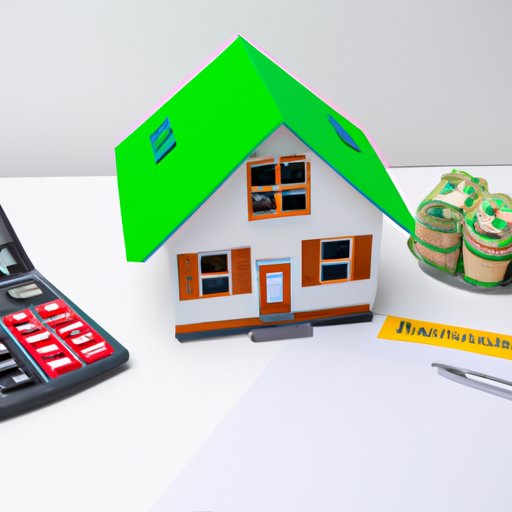Introduction
Buying a house is a major step in life. It can be intimidating to think about all the financial aspects that come along with it. The good news is that there are steps you can take to make sure you are prepared financially. The purpose of this article is to discuss how to prepare financially to buy a house.

Establishing a Budget and Saving for a Down Payment
The first step in preparing financially to buy a house is to establish a budget. Take some time to look at your income and expenses, and figure out what you can save each month. This will give you an idea of how much money you have to work with when it comes to buying a house. Once you have a budget in place, start saving for a down payment. Aim to save as much as possible, since a larger down payment can lead to lower monthly payments and less interest over the life of the loan.

Checking Credit Score and Improving It
It’s also important to check your credit score before you start looking for a loan. Your credit score is a three-digit number that lenders use to evaluate your creditworthiness. The higher your score, the better chance you have of being approved for a loan and getting a better interest rate. If your score isn’t as high as you would like, start working to improve it. Pay bills on time, reduce your debt, and avoid taking on more debt if possible.
Researching Loan Options
Once you know your budget and credit score, it’s time to start researching loan options. There are several different types of loans available, each with their own benefits. Some common loan options include fixed-rate mortgages, adjustable-rate mortgages, FHA loans, and VA loans. Do your research to understand the terms, fees, and interest rates associated with each type of loan so you can make an informed decision.

Calculating Total Cost of Homeownership
When you’re buying a house, it’s important to consider all the costs involved. Beyond the purchase price, you’ll need to factor in taxes, insurance, closing costs, and other expenses. Make sure you have a clear understanding of the total cost of homeownership before you commit to a loan.
Speaking with Financial Advisor
It’s also a good idea to speak with a financial advisor before making any decisions. A financial advisor can provide valuable insights into the process and help you determine which loan option is best for your situation. When choosing an advisor, make sure they are experienced and qualified to offer sound advice.
Shopping Around for Best Mortgage Rate
Finally, it’s important to shop around for the best mortgage rate. Different lenders may offer different rates, so it pays to compare offers from multiple lenders before deciding on one. You may also be able to negotiate a lower rate if you’re willing to pay discount points or have a larger down payment.
Conclusion
Buying a house is a major step in life. To make sure you’re financially prepared, it’s important to establish a budget, check your credit score, research loan options, calculate the total cost of homeownership, speak with a financial advisor, and shop around for the best mortgage rate. By following these steps, you can ensure you’re in the best position to make a smart decision when it comes to buying a house.
(Note: Is this article not meeting your expectations? Do you have knowledge or insights to share? Unlock new opportunities and expand your reach by joining our authors team. Click Registration to join us and share your expertise with our readers.)
